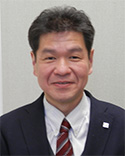Education and Research Center of Legal Medicine, Chiba University was opened in April 2014. Consisting of six departments that collaborate with each other based on the existing Department of Legal Medicine, the Center not only engages in teaching and research, but also advances the practice of forensic investigation. Legal medicine is an academic discipline in which researchers establish the causes of injury or death to utilize this knowledge for the sake of living people, with the objective of contributing to the protection of people’s rights, the safety of society, and the improvement of social welfare. The Center is equipped with world-leading technologies, and applies them to its teaching, research, and practice.
Welcome to the website of Education and Research Center of Legal Medicine, Chiba University
Education and Research Center of Legal Medicine was established in 2014 to train doctors, dentists, pharmacists, technicians, and other professionals in the field of legal medicine to carry out highly specialized duties.
Legal medicine is an academic discipline that goes beyond the performance of autopsies to determine the cause of a person’s death. In addition to autopsy, an investigation of the cause of death also requires a range of other tests, including pharmacological tests, imaging, and blood and urine biochemistry tests. If skeletal remains are discovered, establishing the person's identity and the environment in which they lived is crucial for determining whether their death was due to suicide, homicide, or accident.
DNA testing and dental examinations are necessary for the determination of identity, and must take into account phenomena characteristic of cadavers, including the changes caused by decomposition and the post-mortem redistribution of pharmacological substances. Given the possibility of contamination of minute test samples, particular experience and expertise beyond the forensic tests performed by police and the tests on biological samples carried out in general hospitals are also required, as is a different level of quality control. In other countries, the specialists who carry out these difficult tests are trained in institutions known as forensic institutes and then take charge of these investigative duties; however, no such institution has previously existed in Japan. The reality is that, although these tests should be performed by highly specialized staff, they were in fact being carried out in Japan by amateurs with a low degree of accuracy.
In many countries, legal medicine also involves not only autopsying cadavers but also examining the victims of child abuse or domestic violence, enabling them to be taken into care before the situation escalates; however, with the exception of a few universities, such a system is also lacking in Japan.
Education and Research Center of Legal Medicine has been established with the aim of rectifying this situation by shaping career paths for practitioners, educators, and researchers in six specialist fields of legal medicine (forensic pathology, forensic radiology and imaging, forensic toxicology, forensic odontology, forensic genetics, and clinical forensic medicine), and continuously training professionals to raise the level of legal medicine practiced in Japan.
My colleagues at the Center and I will spare no effort to help make society safer in Japan, and welcome your criticisms and encouragements.

